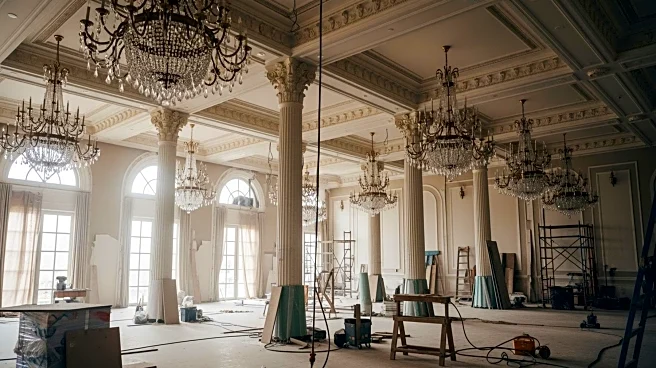What's Happening?
Comedian Bill Maher expressed mixed feelings about President Trump's decision to demolish the East Wing of the White House to construct a new ballroom. Maher joked about being 'kind of jealous' of the speed of the demolition but warned that the symbolism
suggests Trump is not planning to leave office. The demolition has sparked controversy, with Senate Minority Leader Chuck Schumer criticizing it as a 'vanity project.' Trump defended the move, stating the East Wing was ready to be replaced and that the new ballroom has been desired for over 150 years. The project, initially estimated to cost $200 million, has increased to $300 million, funded by private donors.
Why It's Important?
The demolition of the East Wing and the construction of a new ballroom at the White House have significant implications for public perception of President Trump's administration. Critics argue that the project reflects Trump's focus on personal legacy and grandeur, potentially overshadowing pressing national issues such as economic challenges and healthcare costs. The move has drawn criticism from Democrats and preservationists, who view it as a disregard for historical preservation and public consultation. The funding from private donors raises concerns about potential influence and corruption, highlighting the administration's priorities amid broader economic struggles.
What's Next?
The completion date for the new ballroom has not been announced, leaving uncertainty about public and political reactions once the project is finished. The controversy may continue to fuel debates about presidential priorities and the use of private funds for public projects. As construction progresses, stakeholders, including political leaders and historians, may further scrutinize the implications of the demolition and the new ballroom's impact on the White House's historical integrity.
Beyond the Headlines
The demolition of the East Wing could symbolize broader themes of President Trump's approach to governance, characterized by bold and controversial decisions. The project may reflect an autocratic-style obsession with grand projects, raising questions about the administration's focus on personal legacy over public service. The transformation of the White House's landscape may become a lasting metaphor for Trump's presidency, influencing public discourse on leadership and historical preservation.















